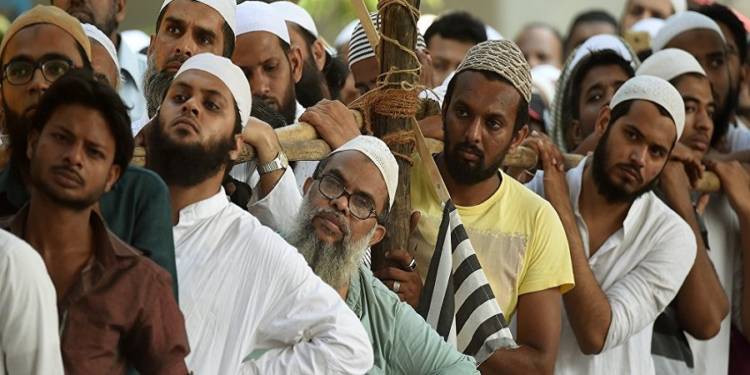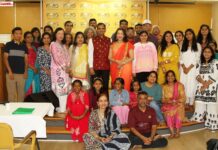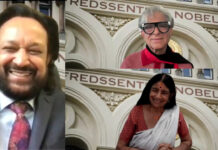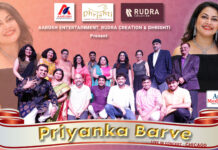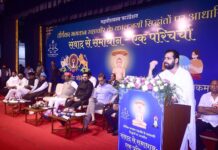Be a Symbolic Muslim or just a ‘Muslim’
A.Q. Siddiqui
Long ago, Dr Muhammad Iqbal, Urdu poet and Pioneer of Partition, commented that Muslims in India are more like practicing Hindus. He was popularly known as Allama Iqbal. Allama Iqbal’s ancestors were from a Kashmiri Brahman gotra Sapru. They were converted from Shaivite Hinduism to Islam.
But the times of Allama Iqbal have long passed. That was a time when you could hardly distinguish between a Muslim and Hindu. Both looked identical, both spoke the same language. Even Allama Iqbal did not sport a beard. I remember in 1973 when I entered in my Mumbai college for the first day, everyone looked alike. We were just young Indians. Now go to any college and you can easily identify who is Muslim and who is Hindu. So much that the PM of India was quoted saying, “you can identify them with their garments”.
When did this transformation of a good Indian Muslim happen to be a “symbolic Muslim”? Is it mandated in Islam that a Muslim must wear a scull cap, KurtaPyjama and sport a beard? The beard is recommended by Prophet Muhammad (pbuh).
But it is a recommendation, not mandated. An Islamic scholar has rightly said, “Beard is in Islam, Islam is not in beard”. When a companion of Prophet (pbuh), Hazrat Zaid came to him with his friends and told to Prophet that they were going to Syria for a trade purpose. He asked for guidance from Prophet, “There are only Jews and Christians. They will ask us who are we, what shall we say?”
Prophet gave them a short advice, “Tell them you are Muslim”. The Prophet was asked further, “And if they offer us their food?”. The Prophet, peace be upon him told them, “Mention God’s name and eat of it.”
The religion of Islam was simplified and completed by Prophet (pbuh) for the followers in his lifetime.
The advice of Prophet given at that is more relevant for the guidance of Indian Muslims today. Lack of leadership, ambiguous guidance from self-proclaimed scholars, rigidness in matter of faith, extremism in Islamic symbolism, looking up at Muslim world for support and nurturing a perennial fear for survival, are some of the factors responsible for Indian Muslims’ isolation from mainstream.
Much blame goes to leadership and scholars. When scholars and Moulvis preach a large gathering, the role model is not 100 percent Sunnah but an adulterated Sunnah. A look at pictures of these so-called scholars, now celebrities on YouTube, reminds the famous Shakespearean quote, “Physicians heal thyself”. Most of them have clean shaved moustache and long beards. Even appearance of a scholar matters. The four rightly guided Caliphs who ruled after the death of Prophet Muhammad (pbuh) were role models for the believers and scholars as well.
All these Caliphs have trimmed moustache and trimmed beard. Caliph Omar ibn Al Khattab, the 2nd in row was so keen for his public appearance that every Friday before going to mosque for sermon, he will ask his wife to hold a mirror and look the length of his moustache. If he sees any hair coming over his lip, he will cut it. His wife would stitch his torn-out gown and ask him why he is so keen for his appearance. Omar replied, “I stand in front of so many Muslims in Prophet’s mosque. They will look up at me. I do not want my appearance least different as desired by Prophet.” He reminded that, “Prophet asked to trim moustache so that the hair will not touch the drink in a cup.”
The Prophet did not ask to clean shave the moustache. These scholars appearing in public view with clean shaved moustache are not in tune with Sunnah. A lady scholar on YouTube is preaching Islam and viewers can see her eyes only. She is completely covered. Her appearance will mislead many Muslim women. Face cover of women is not mandated in Islam. Only head cover in public appearance and a decent covering up to bosom is advised.
Being a Muslim is submission to the will of God. For that reason, Prophet (pbuh) advised his travelling companions that reflect the character of a Muslim not the symbol of being a Muslim. “Love everything created by God,” said Prophet (pbuh).
A Muslim by his acts is one loved and desired by people around him. His neighbor should feel safe with him. His friendship be desired. When Prophet was often asked for guidance for being a good Muslim, he always said, “perform your prayers in time, pay Zakat (charity) to poor”.
Once a villager came to him and said, “O Prophet, I have full faith in Allah, I never miss my 5-time prayers, I do Ramadan fasting, I pay Zakat and Inshallah I will perform Hajj. Do you think I am eligible for Jannat(paradise)?”. The Prophet(pbuh) answered, “I guarantee you will enter Jannat”. The chapter is closed. Nothing more is required to be a good Muslim. The rigidness in being a symbolic Muslim, wearing a cap, KurtaPyjama, asking air hostesses for Sahoor or Iftaar on board a flight and offering prayers in galleys, will not earn an extra reward from God Almighty.
Fasting in travel is not advised. Shortening of prayers are desired through a journey. Let not your, being a Muslim be frowned upon by Non-Muslim. By indulging in Shab-e-barat celebration, not required at all in Islam and scuffling with security forces for Friday prayers during lockdown period, Indian Muslims brought focus back on their rigid symbolic image.
“Unto you is your religion and unto mine is my religion” is the unique advice in Holy Quran for Muslims.

